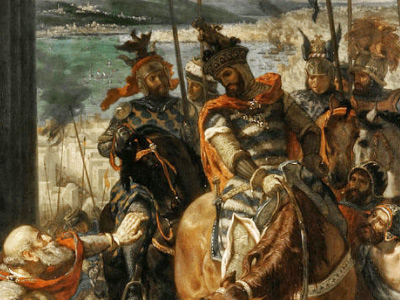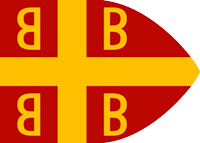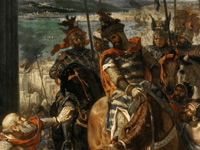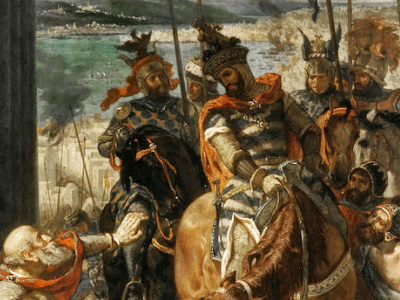Fourth Crusade (1202–04)

Attack on Zadar
There was no binding agreement among the crusaders that all should sail from Venice. Accordingly, many chose to sail from other ports, particularly Flanders, Marseilles, and Genoa. By May 1202, the bulk of the crusader army was collected at Venice, although with far smaller numbers than expected: about 12,000 (4–5,000 knights and 8,000 foot soldiers) instead of 33,500. The Venetians had performed their part of the agreement: there awaited 50 war galleys and 450 transports – enough for three times the assembled army. The Venetians, under their aged and blind Doge Dandolo, would not let the crusaders leave without paying the full amount agreed to, originally 85,000 silver marks. The crusaders could only initially pay 35,000 silver marks. The Doge threatened to keep them interned unless full payment was made so a further 14,000 marks was collected, and that only by reducing the crusaders to extreme poverty. This was disastrous to the Venetians, who had halted their commerce for a great length of time to prepare this expedition. In addition, about 14,000 men or as many as 20–30,000 men (out of Venice's population of 60–100,000 people) were needed to man the entire fleet, placing further strain on the Venetian economy.
Dandolo and the Venetians considered what to do with the crusade. It was too small to pay its fee, but disbanding the force gathered would harm Venetian prestige and cause significant financial and trading loss. Dandolo, who joined the crusade during a public ceremony in the church of San Marco di Venezia, proposed that the crusaders pay their debts by intimidating many of the local ports and towns down the Adriatic, culminating in an attack on the port of Zara in Dalmatia. The city had been dominated economically by Venice throughout the 12th century but had rebelled in 1181 and allied itself with King Emeric of Hungary and Croatia. Subsequent Venetian attempts to recover control of Zara had been repulsed, and by 1202 the city was economically independent, under the protection of the King.
King Emeric was Catholic and had himself taken the cross in 1195 or 1196. Many of the crusaders were opposed to attacking Zara, and some, including a force led by the elder Simon de Montfort, refused to participate altogether and returned home. While the Papal legate to the Crusade, Cardinal Peter of Capua, endorsed the move as necessary to prevent the crusade's complete failure, the Pope was alarmed at this development and wrote a letter to the crusading leadership threatening excommunication.
In 1202, Pope Innocent III, despite wanting to secure papal authority over Byzantium The Byzantine Empire, also referred to as the Eastern Roman Empire or Byzantium, was the continuation of the Roman Empire primarily in its eastern provinces during Late Antiquity and the Middle Ages, when its capital city was Constantinople. It survived the fragmentation and fall of the Western Roman Empire in the 5th century AD and continued to exist for an additional thousand years until the fall of Constantinople to the Ottoman Empire in 1453., forbade the crusaders of Western Christendom from committing any atrocious acts against their Christian neighbours. However, this letter was concealed from the bulk of the army who arrived at Zara on 10–11 November 1202, and the attack proceeded. The citizens of Zara made reference to the fact that they were fellow Catholics by hanging banners marked with crosses from their windows and the walls of the city, but nevertheless the city fell on 24 November 1202 after a brief siege. There was extensive pillaging, and the Venetians and other crusaders came to blows over the division of the spoils. Order was achieved, and the leaders of the expedition agreed to winter in Zara, while considering their next move. The fortifications of Zara were demolished by the Venetians.
The Byzantine Empire, also referred to as the Eastern Roman Empire or Byzantium, was the continuation of the Roman Empire primarily in its eastern provinces during Late Antiquity and the Middle Ages, when its capital city was Constantinople. It survived the fragmentation and fall of the Western Roman Empire in the 5th century AD and continued to exist for an additional thousand years until the fall of Constantinople to the Ottoman Empire in 1453., forbade the crusaders of Western Christendom from committing any atrocious acts against their Christian neighbours. However, this letter was concealed from the bulk of the army who arrived at Zara on 10–11 November 1202, and the attack proceeded. The citizens of Zara made reference to the fact that they were fellow Catholics by hanging banners marked with crosses from their windows and the walls of the city, but nevertheless the city fell on 24 November 1202 after a brief siege. There was extensive pillaging, and the Venetians and other crusaders came to blows over the division of the spoils. Order was achieved, and the leaders of the expedition agreed to winter in Zara, while considering their next move. The fortifications of Zara were demolished by the Venetians.
When Innocent III heard of the sack, he sent a letter to the crusaders excommunicating them and ordering them to return to their holy vows and head for Jerusalem. Out of fear that this would dissolve the army, the leaders of the crusade decided not to inform their followers of this. In any event, Innocent shortly reconsidered his decision. Regarding the Crusaders as having been blackmailed by the Venetians, in February 1203 he rescinded the excommunications against all non-Venetians in the expedition.
HISTORY

RESOURCES
This article uses material from the Wikipedia article "Fourth Crusade (1202–04)", which is released under the Creative Commons Attribution-Share-Alike License 3.0.
© Stories Preschool. All Rights Reserved.






